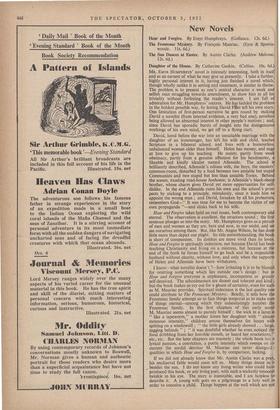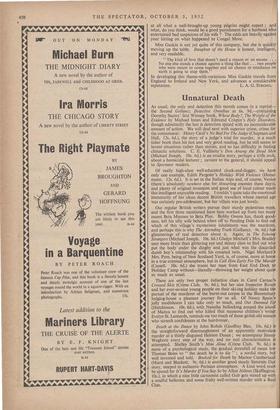New Novels
Hear and Forgive. By Emyr Humphreys. (Gollancz. 12s. 6d.) The Frontenac Mystery. By Francois Mauriac. (Eyre & Spottis-, woode. I ls. 6d.) Daughter of the House. By Catherine Gaskin. (Collins. 10s. 6d.) MR. EMYR HUMPHREYS' novel is intensely interesting, both in itself and as an earnest of what he may give us presently. I take a further, highly personal interest in it, having just finished a novel which, though wholly unlike it in setting and treatment, is similar in theme. The problem is to present as one's central character a weak and selfish man struggling towards amendment, to show him in all his triviality without forfeiting the reader's interest. I am full of admiration for Mr. Humphreys' success. He has tackled the problem in the boldest possible way, by letting David Flint tell his own story. One limitation of first-person narrative he gets round by making David a novelist (from internal evidence, a very bad one), novelists being allowed an abnormal interest in other people's motives ; and, since David has sporadic bursts of insight into the disingenuous workings of his own mind, we get off to a flying start.
David, lured before the war into an unsuitable marriage with the daughter of an ironmonger, has left his wife and child, teaches Scripture in a bilateral school, and lives with a humourless, unbalanced woman older than himself. Helen has money, and nags at him to give up his teaching. He resists, partly from weak obstinacy, partly from a genuine affection for his headmaster, a likeable and kindly idealist named Allenside. The school is brilliantly described, Allenside's odious wife, the boys, the masters' common-room, disturbed by a feud between two amiable but stupid Communists and two stupid but less than amiable Tories. Behind the scenes, exuding road-house bonhomie, is Allenside's black-sheep brother, whose charm gives David yet more opportunities for self- dislike. In the end Allenside ruins his own and the school's pros. pects by sticking to a principle, mistakenly, since it leads him to appoint the wrong man ; and David, forsaken by all his protectors; remembers God—" It was time for me to become the victim of my own propaganda "—and slinks back to his wife.
Hear and Forgive takes hold on real issues, both contemporary and eternal. The observation is excellent, the structure sound ; the first sentence plunges us into the story. Mr. Humphreys gives us a picture of men and women as they are, here and now, in our midst, and we see ourselves among them. But, like Mr. Angus Wilson, he has done little more than depict our plight. Its title notwithstanding, the book is short of compassion. Its dislikes are more vivid than its loves. Hear and Forgive is spiritually indecisive, not because David has been teaching Christianity and living on a mistress, but because at the end of the book he forces himself to go back and be a respectable husband without charity, without love, and only when the supports of Helen and Allenside have been withdrawn.
I know—what novelist doesn't 7—how irritating it is to be blamed for omitting something which lies outside one's design : but in Hear and Forgive everyone is unpleasant, incompetent or grossly self-deceived. The schoolmasters are decent and tolerant and kind ; but the book makes us cry out for a gleam of certainty, even for such as M. Mauriac provides. Spiritual indecision is the last quality one could attribute to The Frontenac Mystery. Briefly, it tells how the Frontenac family attempt so to face things temporal as to make sure of things eternal—among which they unhesitatingly number the Frontenac family. In the first chapters of this early novel M. Mauriac seems almost to parody himself : the wick in a lamp is " like a tapeworm," a mother kisses her daughter with " almost ravenous intensity," children amuse themselves for hours with spitting on a windowsill ; " the little girls already showed ... large, sagging behinds " ; " it was doubtful whether he even noticed the food dribbling from her horrible mouth, or heard her eructations," etc., etc. But the later chapters are masterly ; the whole book has a lyrical passion, a conviction, a poetic intensity which sweeps on its current the sordid detritus M. Mauriac can never disregai : qualities in which Hear and Forgive is, by comparison, lacking.
If we did not already know that Mr. Austin Clarke was a poet, his mediaeval fable would soon tell us. Many things dance in it besides the sun. I do not know any living writer who could have produced this book, or any living poet, with suchlt wickedly innocent twinkle in his eye. The story is inimitable, and I am helpless to describe it. A young wife goes on a pilgrimage to a holy well in order to conceive a child. Things happen at the well which are not at all what a well-brought-up young pilgrim might expect ; and what, do you think, would be a good punishment for a husband who entertained bad suspicions of his wife ? The odds are heavily against your hitting on what happened to Congal More.
Miss Gaskin is not yet quite of this company, but she is quickly moving up the table. Daughter of the House is honest, intelligent, and very readable.
" The kind of love that doesn't need a reason or an excuse. .. . No one else stands a chance against a thing like that ... two people who were meant to come together and no chance or mischance on earth is going to stop them. '
In developing this theme-with-variations Miss Gaskin travels from England to Ireland and New York, and advances a considerable



















































 Previous page
Previous page